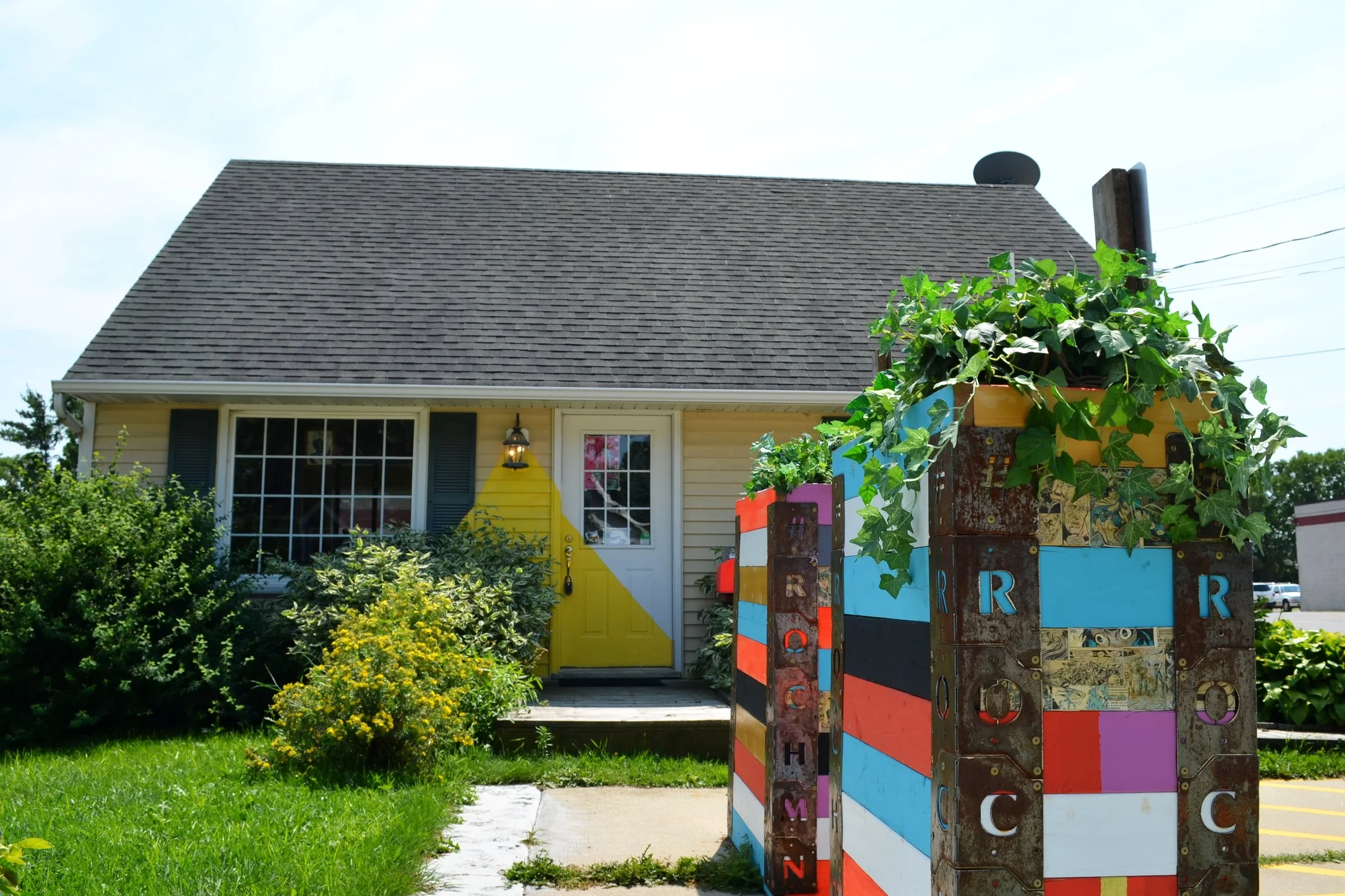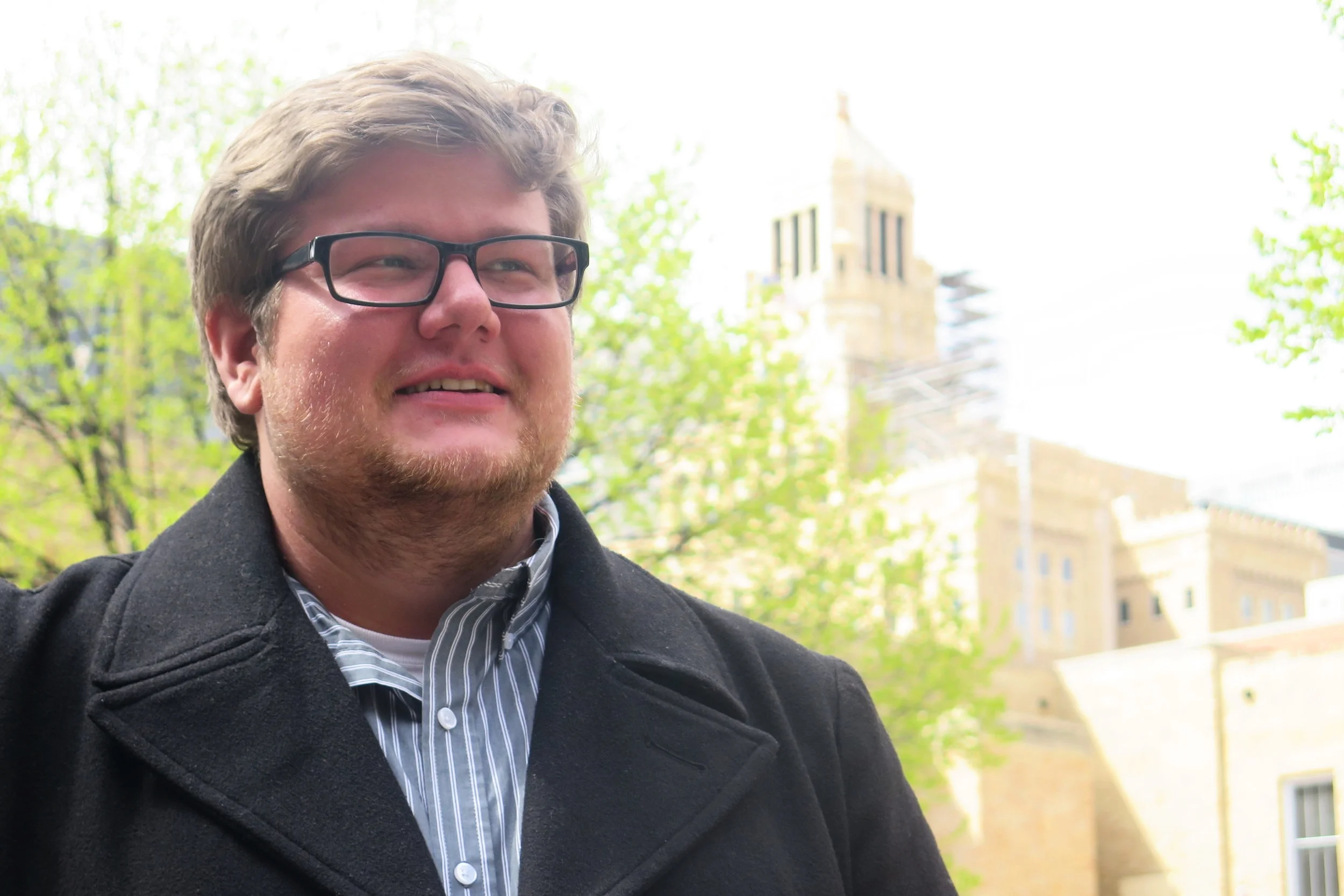What's brewing in the Cooke Park neighborhood?
Abe Sauer is a man of many talents.
You may recognize him as the coffee trike man. (I can say undoubtedly that it is my favorite coffee.) He often stands for long hours in the sun at the farmers market or along Second Street — depending on the day — serving up fresh brew as well as his signature bánh mì sandwiches.
However, most people don’t know that Abe started off in the corporate world — and has spent time living in Beijing and Shanghai. He's also a writer whose scope of work ranges from a children's book to columns in Esquire and The Atlantic.
Now, with his family settled here in Rochester, Abe has brought his knowledge of business together with his love of coffee — and just recently opened a coffee shop in the Cooke Park neighborhood.
The shop's exterior features a mural by local artist Bobby Marinez / Micalyn Maier
With a vibe as unassuming as Abe's demeanor, Old Abe Coffee Shop feels like you are being welcomed into someone’s home. Abe has an interesting perspective on the purpose of a coffee shop, saying “A coffee shop should give something back to the neighborhood, as much as the neighborhood gives to it.”
I recently sat down with Abe to find out what sparked this latest project. Responses are slightly edited for clarity.
What was the inspiration for starting a coffee trike?
We had moved here a number of years ago, and we were downtown. I went to get coffee at Starbucks or something. I got there and it was closed. I couldn't believe it. It was shocking. We went up to the skyway and found another coffee place, but the line was 35 people long. That told me that there was an imbalance of supply and demand when it came to coffee in Rochester.
We looked at [Peace Plaza]. I have lived overseas for a good portion of my life and anytime there is a giant, open, public space like that, there is activity. Commercial activity. A ton of life. Peace Plaza is very beautiful, but it is cleansed of everything, including activity. I was very into bicycles ... and I was very into coffee, so I just combined those things and looked up the laws for vendors in the Plaza. There was a very small overlap for doing what I thought was possible. I started out at the farmers market just testing the idea, and jumped through other hoops to get it into the Plaza.
Abe's custom-made coffee trike / Med City Beat
How much experience did you have with coffee?
I had a lot of experience with coffee, but none in a professional setting. I have never worked at a Starbucks or something. All my experience has been home equipment. I specialize in cold brewing, so it's a lot different than an espresso model. I can run an espresso machine, but there is a lot of different skills involved, especially in the semi-manual and manual machines. Modern espresso machines are all full auto now where all you do is push buttons. I know how to to grind and weigh my own coffee and make sure the portafilter is packed correctly, but am no means an expert. Go talk to the crew down at Steam and Bravo Espresso. They know how to make espresso really well. My background is just making cold brew through many different methods.
What originally brought you to Rochester?
My wife grew up in Minneapolis, but she lived here as a kid and went to Jefferson Elementary School in 1984. She says it hasn't changed. She had a connection to this town. We lived overseas, and initially we were in the region just looking for a good place to settle down.
Rochester just had a good number of things. It had opportunities for my wife because she works in medicine and it had opportunities for our kids because the school system here is amazing. I don’t know if Rochester knows how good the public school system is. It is unbelievably good. If we went other places, we would pay, in addition to taxes, $10,000 a year to put our children in a school as good as any of the public schools in Rochester.
It is a really great place to raise a family. The school system, the cost of living, the safety, the family atmosphere — it hit all the qualities we like in a region.
What make this new coffee shop unique?
It’s a house, so it’s got that. I think it’s unique in that it's really focused on the neighborhood. This is a community-focused place. It encourages you to walk here or to bike here. If you're already using Cooke Park, it encourages you to rest here. I’ve talked to people in the Washington neighborhood, and they're really supportive of having a place they can walk to.
Abe's shop is located at 832 7th St NW / Micalyn Maier
This idea of getting in your car, and driving to the place you want to go to, and then driving back to your house is a very old idea that, unfortunately, Rochester is designed for. So getting these kinds of small, community focused coffee shops and retail into the neighborhoods is very important.
It’s going to be hard because right now parking is a problem. They’re wanting to build all these huge parking lots, but nobody wants to live next to a big parking lot. So getting these little community places to neighborhoods is a challenge.
How do you make coffee differently than most coffee places?
Well I cold brew everything. Even the hot coffee. It really changes the taste. It’s actually a whole pH point different, so it’s far less acidic. One of the problems people have with coffee is that it’s too bitter, and that’s the acid. Your tongue gets hit with acid and the first thing it does is revolt. If you take that acid level down, then you get automatically smoother coffee. You can change the taste by the way you brew it.
I also try to use beans as fresh as possible off the roast. I don’t use super cheap beans. I also do things like use maple syrup, and nobody does that. I also make vietnamese coffee, and nobody does that. I also make bulletproof coffee, and nobody does that. I try to fill the menu with stuff that is very unique.
What did you do before you were making coffee?
I worked in China as part of the U.S. embassy in their school. I was a facilities coordinator. Then, I moved to New York, and I did some international development work for aid organizations. Then, I switched to doing corporate stuff. I worked for a giant branding and advertising company called Interbrand. One of the world’s biggest. I was one little tiny cog in a wheel of the company.
That is very different than owning a coffee business. How does your life compare now?
It’s harder work now, honestly. There were long days before and it was stressful sometimes, but it was always sitting in an office. There was no physical hardship to my day. No lifting a 60 pound bag of something or sitting in the sun. There is a lot more freedom now. I am my own boss; I can do what I want. There are no meetings. I used to go to a lot of meetings. Hours and hours of meetings.
Many of the beans Abe uses come from roasters based here in Minnesota / Micalyn Maier
Would you say that you enjoy this more?
Most definitely. It’s something of my own. I think that’s important. When I was working in corporate, it was such a giant brand that I didn't feel like I owned any of what I was doing. Now, there’s an ownership.
Where do you see this coffee shop going in the future?
I hope it becomes a known entity within this neighborhood. A coffee shop should give something back to the neighborhood, as much as the neighborhood gives to it. For example, if a coffee shop comes to your neighborhood and gets plunked down within a few blocks of your house, your home value should go up. It should be valuable for your neighborhood to have that place.
The problem with modern coffee is that so much of it is designed for drive through traffic that it becomes this island of concrete. There's cars going in and out. The modern coffee chain actually brings your property value down because nobody wants to live next to something like that. So I would like to see my coffee shop be appreciated by this neighborhood, and in a bigger picture I would like to see it become a part of a block of interesting retail.
Written by contributor Micalyn Maier. A senior at Mayo High School, Micalyn enjoys reading, writing and traveling. She wants to pursue a career in journalism covering social justice issues.
Cover photo by Micalyn Maier











